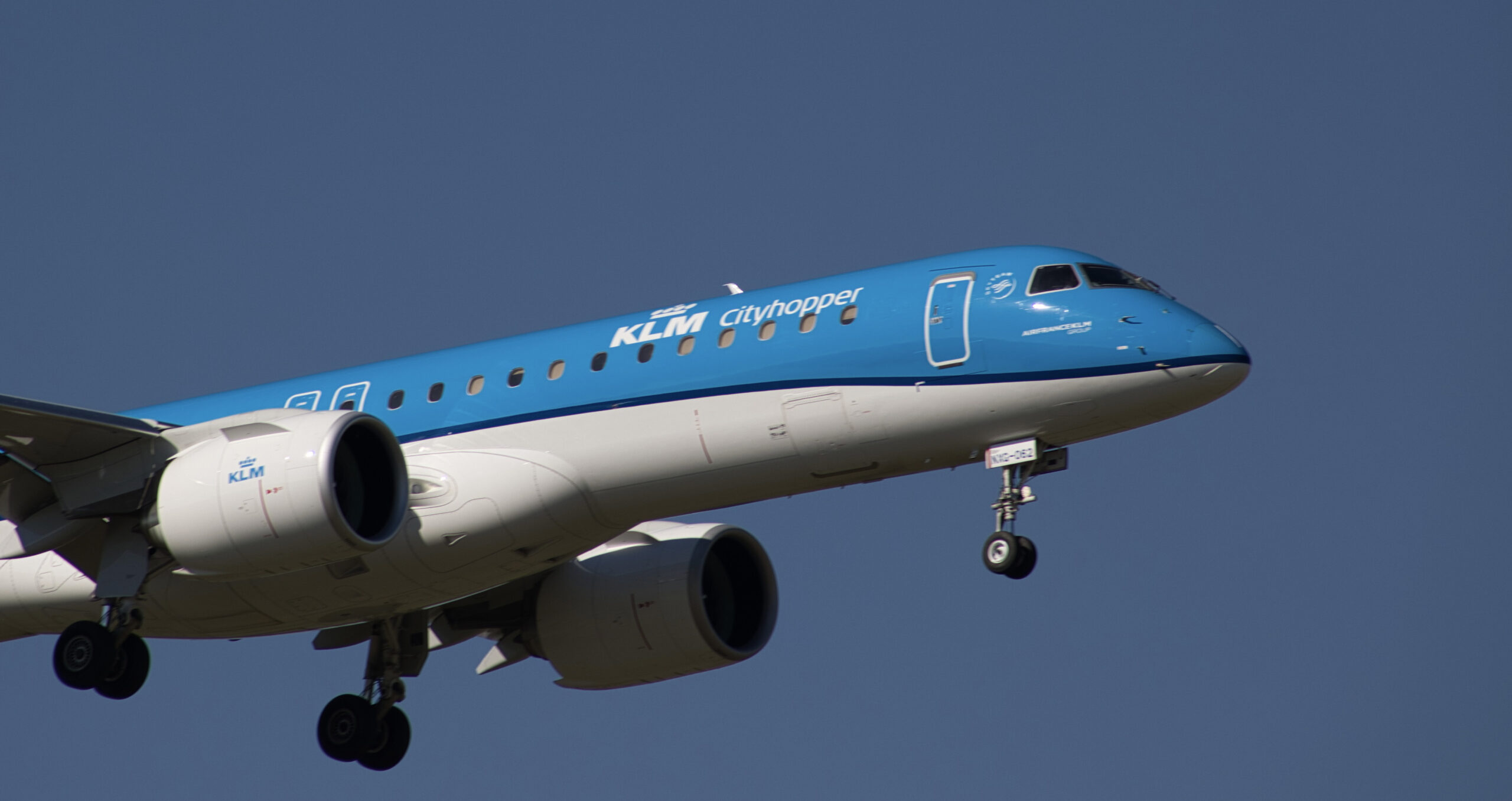

Greenwashing litigation against aviation companies is on the rise internationally, with cases brought against both KLM and Delta Air Lines. Environmental groups say that despite its claims, the industry has no credible pathway to sustainability.
In July, a Dutch climate change group sued national carrier KLM in a landmark greenwashing litigation case. It followed on the heels of an EU-wide complaint launched two weeks prior by the European Consumer Organisation (BEUC) against 17 airlines for misleading climate-related claims.
Up until that point, the aviation industry – a high carbon emitter – had largely managed to avoid litigation. However, this appears to be changing.
“KLM is trying to convince people that they are on a pathway to sustainable aviation,” says Hiske Arts, lead campaigner at Fossil Free Netherlands (Fossielvrij NL), the non-profit bringing the charges with the support of legal group ClientEarth. “Aviation does not have a credible pathway to sustainability, so they use this green marketing to lull us into a false sense of security when they are only doing this to prevent ‘degrowth’ measures.”
Across the Atlantic, airlines are also facing greater scrutiny (despite the backlash from Republican politicians against environmental, social and governance measures). In the traditionally Democratic state of California, a class-action lawsuit has been brought against Delta Air Lines over its $1bn pledge, made in 2020, to become carbon neutral over the next 10 years, which would be supported by the use of carbon credits that the lawsuit argues are not of sufficiently good quality.
Carbon offsets and sustainable fuels
The greenwashing complaints centre around airlines’ carbon offset plans and their claims around the development of sustainable aviation fuels. “No offsetting schemes effectively pull CO2 out of the air,” says Klara Maria Schenk, lead transport campaigner at Greenpeace’s European mobility for all campaign. “Most of the offsetting schemes that are being used are actually just the promise that natural carbon sinks, such as forests, are not going to be cut down.”
Another key issue with carbon offset schemes is that carbon dioxide removal from the atmosphere takes decades, so the aviation industry is emitting CO2 faster than natural sinks can absorb it.
Meanwhile, campaigners take issue with claims about sustainable aviation fuels, which are alternative jet fuels broadly categorised into biofuels and synthetic electrofuels. According to Stay Grounded, alternative fuels’ potential to mitigate the climate impact of aviation is less than 5 per cent of its total impact by 2030.
Aviation does not have a credible pathway to sustainability, so they use this green marketing to lull us into a false sense of security when they are only doing this to prevent ‘degrowth’ measures
Hiske Arts, Fossil Free Netherlands
Sustainable aviation fuels based on soya and palm oil have also faced heavy criticism, regarding the high risk of deforestation and loss of biodiversity caused when creating large monoculture fields. “There is one technology that could potentially really be green,” says Schenk. “It’s technology where you can create synthetic kerosene from electricity and a carbon source, but the problem is that there is very limited capacity.”
For example, there is currently only one globally viable synthetic E-kerosene plant located in Germany, which is only able to produce 0.00004 per cent of the annual jet fuel demand in the EU alone.
More lawsuits ahead
While most experts agree that aviation will struggle to create a credible path towards carbon neutrality in the next two decades, campaigners have stated that the main purpose of the lawsuits levied against airlines are to stop the “blatant greenwashing claims”.
“We’ve already seen some airlines drop some of their carbon offset arguments. I assume this is because they fundamentally know there’s no equivalence between the amount you can potentially hope to offset versus the emissions of your flight,” says BEUC sustainability team leader Dimitri Vergne.
The lawsuit against KLM has been issued on the legal basis of misleading advertising under the EU’s Unfair Commercial Practices Directive. However, in March 2023, the European Commission adopted a proposal for a directive on green claims, which aims exclusively to stop companies from making misleading claims about the environmental merits of their products and services.
While the directive is not expected to come into force for another few years, the proposal forms a part of larger efforts by lawmakers to clamp down on the practice.
“Greenwashing can be very harmful as a delay-and-deceive tactic against making real efforts towards sustainability,” says Eric Stam, lecturer at Albeda Rotterdam the Hague Airport College. “More greenwashing-related litigation against airlines will come – there’s a genie that will not go back in its bottle.”
Similar Articles

In Brief: EU Council approves two-year delay to parts of CSRD, ISSB publishes digital taxonomy

Pressure mounts on California’s Gavin Newsom to fund climate legislation


